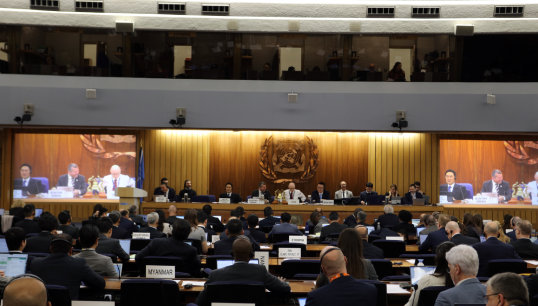- Topics
- Campaigning
- Careers
- Colleges
- Community
- Education and training
- Environment
- Equality
- Federation
- General secretary message
- Government
- Health and safety
- History
- Industrial
- International
- Law
- Members at work
- Nautilus news
- Nautilus partnerships
- Netherlands
- Open days
- Opinion
- Organising
- Podcasts from Nautilus
- Sponsored content
- Switzerland
- Technology
- Ukraine
- United Kingdom
- Welfare

To ensure a Just Transition for the world's seafarers, national and international maritime authorities need to introduce regulations requiring new fuels training to be provided to experienced officers and cadets alike. Sarah Robinson gives an update on this standard-setting work
Almost everyone in maritime now agrees that shipping needs to cut its greenhouse gas (GHG) emissions, and the development of new maritime fuels to achieve this is coming on apace.
Less advanced is the development of international training standards for the seafarers who will be required to work with new fuels on their vessels. However, there has been some progress by the regulators, if only to recognise that seafarer training is an essential part of this big change to the industry.
What is the IMO greenhouse gas strategy?
In 2023, the International Maritime Organization (IMO) adopted its landmark Strategy on the Reduction of Greenhouse Gas Emissions from Shipping. This was the first time that a major international agreement had acknowledged the need for a 'just transition' – the fair deal for seafarers which would include offering them training at no cost to themselves during the switchover to new fuels.
The following is the historic wording in the 2023 GHG Strategy which provides the foundation for the mandatory development of new fuels training:
The mid-term GHG reduction measures should effectively promote the energy transition of shipping and provide the world fleet with a needed incentive while contributing to a level playing field and a just and equitable transition.
For serving officers, new fuels training should be provided as needed by the employer, and Nautilus will keep a close watch on shipowners to ensure they are fulfilling their training obligations under the Just Transition. However, cadets will initially learn about new fuels through their nautical colleges, and Nautilus also has an influence on the courses taught there.
Why do we need amendments to STCW?
The Officer of the Watch training provided by nautical colleges around the world is based on international standards set by the IMO Standards of Training, Certification and Watchkeeping (STCW) Convention. STCW will need to be amended in order to include international training standards on new fuels – a process that will include input from Nautilus via the International Transport Workers' Federation and the International Federation of Shipmasters' Associations.
The STCW amendments will eventually feed into all Officer of the Watch training throughout the world, but this could take years, acknowledges Nautilus head of professional and technical David Appleton: 'We do have agreement that STCW amendments on new fuels training are needed sooner rather than later, which is why the IMO has agreed to consider guidance and regulations related to new fuels outside of the ongoing comprehensive review of STCW. Even then, these amendments will take several years to enter into force. Administrations and colleges need to be looking at this proactively to ensure that the necessary courses are available in good time rather than waiting for mandatory amendments.'
What is the role of national training standards?
National standard-setting bodies also play a role in determining what officer cadets study in the UK and Netherlands. In the UK, the Maritime and Coastguard Agency and Merchant Navy Training Board will be looking at revisions to the nautical college curriculum in relation to new fuels training. In the Netherlands, this work will be done by the industry advisory boards associated with the country's nautical colleges.
Nautilus is represented on all these bodies in the UK and Netherlands, so will have a strong input into the curriculum changes related to new fuels – which will probably happen more quickly than the work at the IMO.
The Union will be pressing for the two countries to take a lead on this, says Mr Appleton: 'Countries that take a proactive approach to this will have a head start over those who don't. As is usually the case at the IMO, countries which have developed their own programmes ahead of mandatory requirements are well placed to ensure that the eventual STCW requirements will closely resemble their national programmes, giving their seafarers a head start in the jobs market.'
Tags
